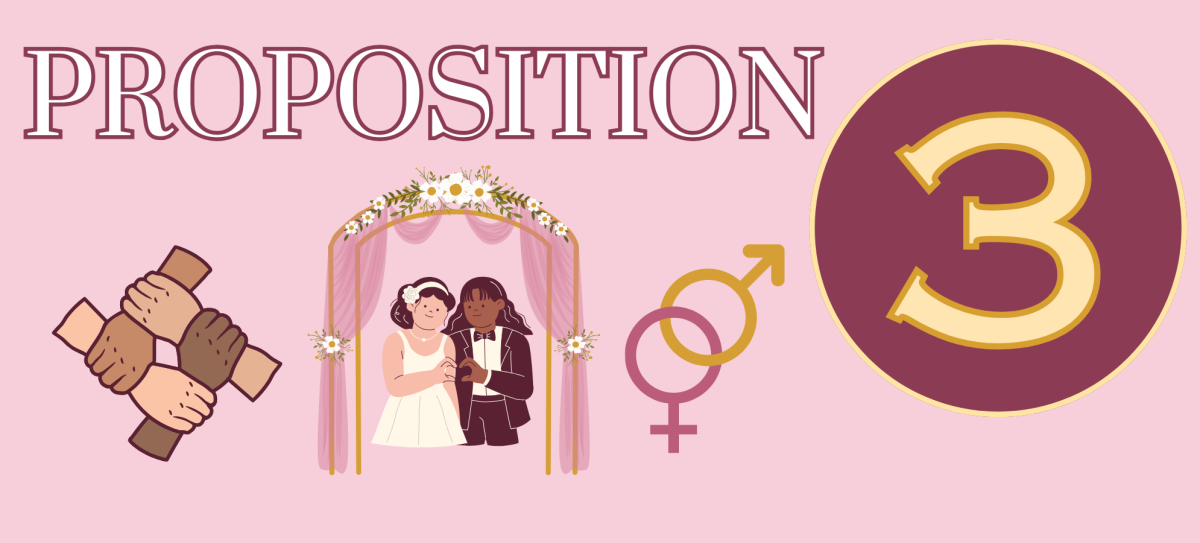Proposition 3 on the Nov. 5 California General Election ballot would repeal Proposition 8, which states that marriage is only between a man and a woman.
Passed in 2008, Proposition 8 was nullified in 2015 when the U.S. Supreme Court ruled in favor of the nationwide legalization of same-sex marriage.
If passed, the proposition would eliminate the language in Section 7.5 of Article 1 of the California Constitution that states, “Only marriage between a man and a woman is valid or recognized in California.” If the proposition is rejected, that language would remain the same, but would not effect the legal status of same-sex marriage in California.
Proposition 3, the Constitutional Right to Marriage, follows the U.S. Supreme Court’s overturning of Roe v. Wade, which ended the constitutional right to abortion. The proposition would provide an extra layer of protection against a potential repeal of the constitutional right to same-sex marriage.
Yes on Prop 3 states, “Now is the time to wipe discrimination from the California Constitution and protect the fundamental right to marry for same-sex and interracial couples.”
Following the overturning of Roe V. Wade, U.S. Supreme Court Justice Clarence Thomas suggested that the Court should reconsider the federal right to same-sex marriage as well as the right to contraceptives.
Supporters of the proposition include Sierra Pacific Synod of The Evangelical Lutheran Church in America, the Dolores Huerta Foundation and Equality California.
The proposition’s opposition is spearheaded by the California Family Council, who states, “Although the U.S. Supreme Court’s 2015 decision in Obergefell v. Hodges effectively overruled Proposition 8, the language remains in our state constitution as a crucial safeguard of traditional marriage.”
The CFC argues that Proposition 3 would remove protections against child marriages, incest and polygamy.
California Family Code Section § 302 (b) allows marriage between two minors to be legal with a court order and written consent from a parent or guardian. Proposition 3 does not affect this law.
California Penal Code Section § 285 explicitly prohibits incestuous marriages. Proposition 3 does not affect this law.
California Family Code Section § 2201 (a) explicitly prohibits subsequent marriages entered into while one or both people are already married to someone else, and therefore prohibits polygamous or bigamous marriages. Proposition 3 does not affect this law.
The proposition’s other significant opposer is Rev. Tanner Di Bella, president of The American Council, a christian non-profit organization previously known as the American Council of Evangelicals.






Mateo • Oct 17, 2024 at 10:20 am
This proposition serves no purpose and is purely virtue signaling. What a total waste of taxpayer money
Mason Koski • Oct 26, 2024 at 7:38 pm
Hi, so that’s not actually true, 1. the cost to taxpayers to put this on the ballot is actually minimal, as this is going to be on the ballot with other statewide propositions (not by itself like Prop 1 in March) and it is a Legislatively Referred Constitutional Amendment. 2. It does serve a purpose, it removes Prop 8 from the Constitution of the State of California and reaffirms that 2 Legally Consenting Adults have the Right to Marry regardless of their sex or gender. and 3. Considering that in the Dobbs V. Jackson Womens Health Decision by the U.S. Supreme Court, both Clarence Thomas & Samuel Alito both hinted at wanting to review Obergefell V. Hodges (which legalized same-sex marriage in all 50 States), if that were to happen today, because Prop 8 is still in, it would set up a whole other legal battle, which would actually cost taxpayers more money.